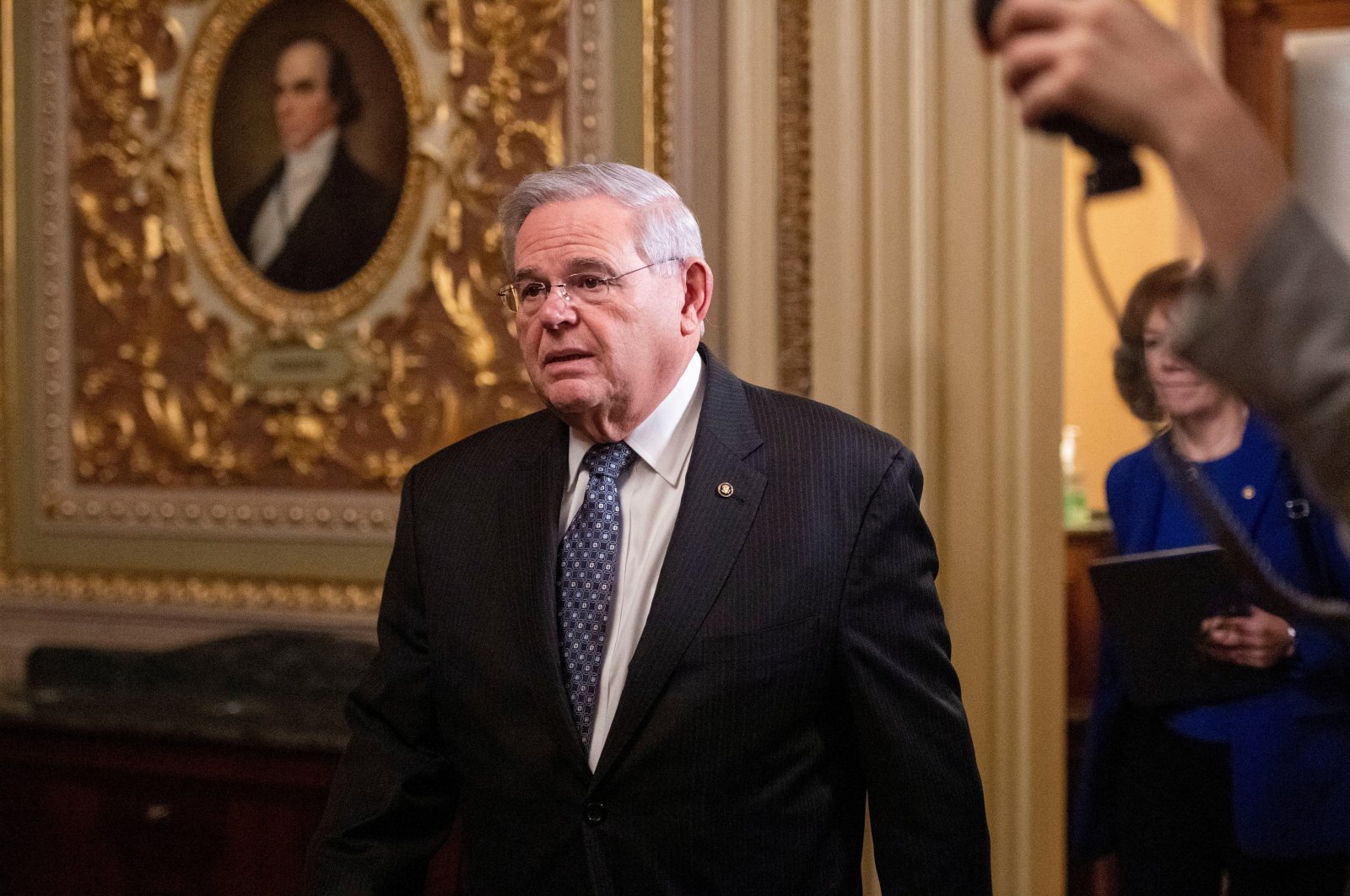
U.S. Senator Bob Menendez, who's known for his anti-Türkiye stance, was found guilty of all 16 criminal counts in his graft probe on Tuesday.
The jury in Manhattan federal court deliberated for more than 12 hours over three days before reaching a verdict in a trial that had taken nine weeks. Menendez, 70, had pleaded not guilty to the charges, which also included acting as a foreign agent and obstructing justice.
U.S. District Judge Sidney Stein set Menendez's sentencing for Oct. 29, a week before the Nov. 5 election in which he is running as an independent in a bid for another six-term term in the Senate, but is considered a long shot to win.
After the jury's foreperson read the verdict, Menendez rested his elbows on the table, clasped his hands together, and stared straight ahead.
The trial centered on what federal prosecutors called several overlapping bribery schemes in which the senator and his wife Nadine Menendez accepted hundreds of thousands of dollars in cash, gold bars and car and mortgage payments from three businessmen who wanted his help.
In exchange for bribes, Menendez helped steer billions of dollars in American aid to Egypt, where one of the businessmen, Wael Hana, had ties to government officials, according to prosecutors. Menendez also was accused of seeking to influence criminal probes involving two other businessmen, Fred Daibes and Jose Uribe.
Hana and Daibes were co-defendants in the senator's trial and were also convicted on each of the counts they faced. Uribe pleaded guilty and testified as a prosecution witness against Menendez.
Menendez previously faced corruption charges but that case ended in a 2017 mistrial in New Jersey on a narrower set of allegations.
Menendez stepped down as chair of the influential U.S. Senate Foreign Relations Committee upon being charged last September, but has resisted calls from fellow Democrats to resign.
During the trial, jurors were handed some of the gold bars that federal agents seized from the New Jersey home the senator shared with his wife. Agents also found more than $480,000 of cash, including some stuffed in envelopes inside a jacket bearing the senator's name.
Defense attorneys argued that Menendez's advocacy for businessmen in his state was normal activity for a senator, and sought to blame his wife, who prosecutors described as a go-between for bribes. Defense lawyers noted that the gold bars were found in her closet. They contended that the two lived largely separate lives and she kept her husband in the dark about her finances.
The defense also said that the senator for decades regularly withdrew cash from banks and stored it at his home. His older sister testified that he picked up the habit from their parents, who fled from Cuba with cash that their father had stored in a clock.
Nadine Menendez is set to be tried separately at a later date. She has not attended her husband's trial after being diagnosed with breast cancer.
Menendez has been a fixture in Washington for more than three decades. He has represented New Jersey in the Senate since 2006 after previously serving 13 years in the U.S. House of Representatives. Prior to that, he served in the New Jersey legislature and as a mayor.
The conviction handed a victory to the U.S. Justice Department as well as to Manhattan U.S. Attorney Damian Williams in Manhattan, who has made weeding out public corruption a priority.
Before being charged, Menendez was not only a powerful Senate committee chair but an important ally in President Joe Biden's efforts to reassert U.S. influence abroad, rally support and money to help Ukraine, and stall advances by China.
Prosecutors said that after Hana gave Nadine Menendez a "sham job" paying $10,000 a month, the senator pressured a U.S. Agriculture Department official to stop scrutinizing a monopoly that Egypt had awarded Hana's company to certify halal meat for export.
Menendez was also accused of trying to pressure law enforcement to lay off Daibes, a real estate developer, and Uribe, an insurance broker who testified that he bought Nadine Menendez a $60,000 Mercedes-Benz in exchange for her husband's help.
Defense lawyers had said prosecutors failed to prove that the gold and cash found in the senator's home were bribe proceeds.
Anti-Türkiye stance
The mounting graft allegations and his close ties to U.S.-based Greek and Armenian lobbies, both financially powerful groups with considerable political clout, have naturally brought under question his longstanding anti-Turkish stance.
In August 2007, the then-U.S. President George W. Bush’s administration withdrew the nomination of Richard Hoagland for the position of Ambassador to Armenia after Menendez, then a member of the Senate Foreign Relations Committee, placed a hold on the nomination due to Hoagland’s "unwillingness to acknowledge" the events of 1915 as a "genocide" – a charge Türkiye vehemently denies.
In Dec. 2019, Menendez co-authored the "Promoting American National Security and Preventing the Resurgence of ISIS Act" in "direct congressional response to Turkey’s military incursion into northeast Syria and attack on the Kurds, as well as their purchase of the Russian S-400 defense system."
Although Türkiye was the first country to fight Daesh terror on the ground with its own troops, Menendez called Turkish actions in Syria "destabilizing" and called for support to "Syrian Kurds" – or rather, members of U.S.-recognized terrorist group PKK’s Syrian wing YPG.
"From purchasing the Russian S-400 air defense system, to engaging in offensive operations in Syria against the Kurds, and committing, directing or knowingly facilitating human rights abuses against our Kurdish allies in Syria, the Foreign Relations Committee is saying enough is enough to [President Recep Tayyip] Erdogan with this strong sanctions package," he said in a statement – also calling for a "Special Immigrant Visa Program" for YPG terrorists.
In the same month, Menendez also spearheaded efforts to make the U.S. government recognize the events of 1915 as a "genocide."
